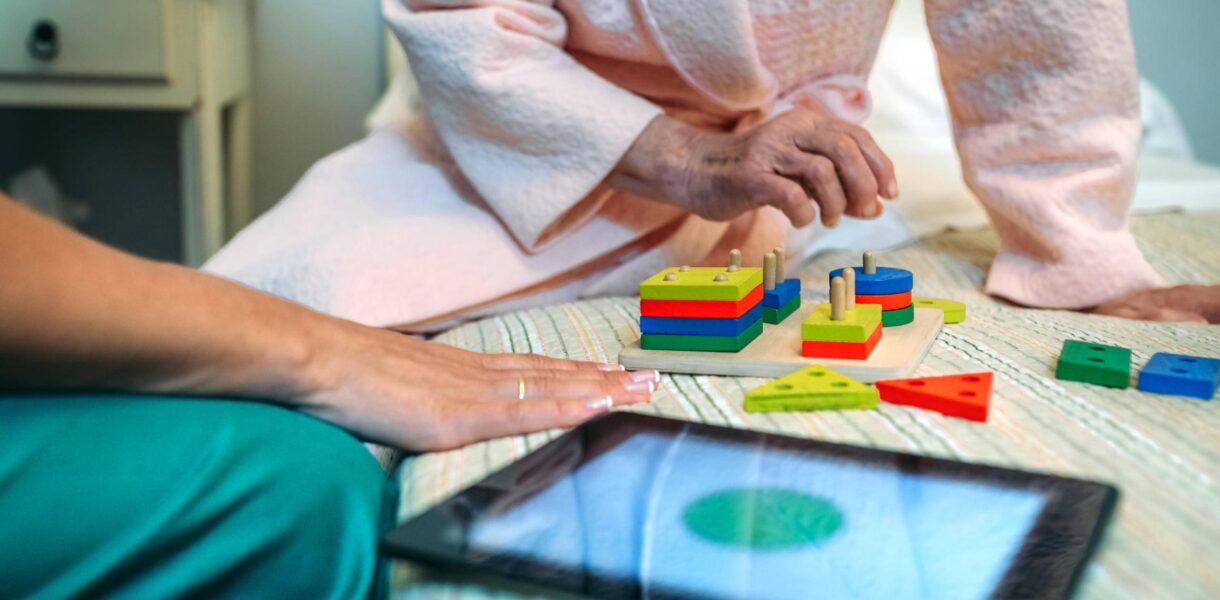
Should You Be Tested for Alzheimers?
Should You Be Tested for Alzheimers?
The idea of being tested for Alzheimer’s disease or other forms of dementia is often scary. Even if you or a loved one have noticed issues that don’t go away – like memory lapses, mood changes or difficulty using language – many of us hope that the issue will go away in time, or we simply put off getting tested because we don’t want to hear the news.
While this is a natural reaction, experts say that it’s best to detect Alzheimer’s disease and other forms of dementia as early as possible. There are medicines and treatments available on the market that can help slow and temporarily halt the progression of the disease, but they are most effective when treatment is begun during the early stages of the disease.
It’s also possible that the symptoms you or your loved one are experiencing are not due to dementia at all, but are a side effect of medications, underlying illnesses, infections or other issues that can be treated. Whether that is the case or not, it is always a good idea to visit your doctor to determine the cause of any unusual or concerning symptoms before they get worse.
There is no one specific test that is used to determine if you or a loved one have Alzheimer’s disease or another form of dementia. Instead, doctors will use a series of tests and exams to help make a diagnosis. While physicians can almost always determine if an individual’s issues are due to dementia, it may be difficult for them to pinpoint the exact type of dementia the individual has.
It’s often wise to have another family member go with you or your loved one during these exams, not just because the person affected may not remember their issues or give clear answers, but also so that there is an extra set of ears to listen, ask questions and take notes. Before getting ready for any medical exams, be sure to have a list of medications, health issues and other important information so you don’t forget anything that could be useful.
Physical Check-up
The first step in “testing” for Alzheimer’s disease is to meet with your primary physician. He or she will perform a medical exam where you’ll review your medical history, changes in behavior or cognitive function, look at what medications you are taking as well as any current and past illnesses. The doctor will also ask about your family’s medical history, including whether anyone in your family has had Alzheimer’s disease or another form of dementia.
Your doctor will perform a full physical check-up, listening to heart and lungs, checking blood pressure, temperature and pulse and collecting samples for laboratory testing (usually urine and blood). This is done to identify any health issues that may be masquerading as dementia symptoms.
Neurological Exam
A neurological exam may take place at the same time as the physical exam, but your primary physician may refer you to a neurologist to have this performed. During a neurological exam, you or your loved one will be evaluated for problems that signal brain disorders – including but not limited to Alzheimer’s disease. The physician will look for signs of strokes (small or large), brain tumors, Parkinson’s disease, fluid accumulation on the brain and other types of illnesses.
The physician will also test reflexes, coordination, speech, sensation, eye movement and more. Depending on the results or what the doctor suspects, a brain imaging study may be ordered.
Mental Testing
The third type of exam that a physician may perform is a mental status test. This is used to evaluate thinking skills such as memory or the ability to problem-solve. These tests give an overall sense of whether the individual being tested is aware of their symptoms, knows where they are (time, date and place) and remember simple instructions.
Two commonly used assessments are the mini-mental state exam (MMSE) and the mini-cog test. During an MMSE, a physician will ask you or your loved one a series of questions that test a range of mental skills that are used every day. The individual is then given a score between 1-30. A score of 25-30 suggests normal mental functioning; 20 to 24 suggests mild dementia; 13 to 20 suggests moderate dementia; and less than 12 indicates severe dementia.
During a mini-cog exam, you or your loved one will be asked to complete two tasks: First, to remember the names of three common objects and repeat them a few minutes later. Second, to draw a clock face showing all 12 numbers in the right spaces, and then mark a time specified by the person giving an exam.
While these are not the only tests that a physician may order to help determine whether your or your loved one have dementia, they are some of the most common. Depending on the results of the various exams, your physician will make a diagnosis and help determine next steps for treatment – whatever the result.
Genetic Testing
In recent years, much has been made about genetic testing options to determine if an individual has what is known as the “Alzheimer’s gene.” Researchers have been able to determine certain genes that can potentially increase the risk of someone developing Alzheimer’s disease. While there are genetic tests available to identify some of these genes, most experts do not recommend routine genetic testing for this purpose.
There are several reasons why this is. First, even if a person carries one of these “high risk genes”, this does not indicate if the person will develop Alzheimer’s disease. Many people who have high risk genes do not develop Alzheimer’s, and many individuals that don’t carry these genes develop Alzheimer’s. Second, medical experts and scientists are still determining the root cause of why Alzheimer’s disease develops – future research may show that these genes are not necessarily the cause of developing the disease. Third, there is currently no cure or vaccine for Alzheimer’s disease, so gaining this knowledge is not necessarily helpful and can actually cause undue stress and worry for the individual.
Home Screening for Dementia
Another recent development is the rise of a number of dementia screening tests that are being directly marketed to individuals. None of these tests have been proven to be accurate in the least, and many of them can result in a false positive. The Alzheimer’s Association strongly discourages the use of home screening tests and instead urges individuals to have a thorough examination from a licensed physician. Currently, medical exams are the only way to determine definitively whether or not someone has dementia.
The Importance of Early Detection
Early detection and treatment of Alzheimer’s disease, while distressing, is actually the best course of action for both the individual and their family members. On the medical side of things, early detection and treatment can allow the individual to preserve their independence for as long as possible and enjoy a high quality of life.
On a personal level, an early diagnosis of Alzheimer’s or another form of dementia allows people to make plans for their future. Because the disease has not progressed to a severe point, you or your loved one will be able to have as much input into their future care as possible and will be able to set their wishes down. If given the choice, most people would probably prefer to select their own memory care community as well as other medical decisions. But often by the time memory care is needed, the individual with Alzheimer’s may be unable to make the choice. This can put undue stress on family members. By getting diagnosed early, you or your loved one can ensure that wishes will be respected.
Avalon Memory Care provides gracious, dignified bedside care for people with Alzheimer’s in Arlington, Irving and Houston. To discuss your future care needs, call us at (469) 382-1899.
See More Articles
-
Visiting Your Aging Parent With Memory Loss at Avalon Memory Care
As a loving son or daughter, you naturally want the best of care for your senior parent. The compassionate assisted living caregivers at Avalon Memory Care want you to know that while your parent is living with us, he or she will receive nothing less than respectful, loving care within our comfortable, safe, and fully-staffed
-
Celebrating New Year’s Day in Memory Care
Families often find that celebrations with their loved ones in memory care are easier when they embrace new traditions. For instance, it may not be practical to expect your loved one to stay up until midnight on New Year’s Eve. Instead, consider throwing a New Year’s Day celebration, complete with a countdown to the first
-
Understanding Parkinson’s Disease and Dementia
Parkinson’s disease is an incurable neurological disorder, with progressively worsening complications. Perhaps the most well-known symptom of Parkinson’s is a hand tremor, but it can also cause speech changes, muscle rigidity, and impaired posture. Eventually, as the disease progresses, more than half of all individuals with Parkinson’s will require dementia care. This particular type of
Testimonials
Downloadable Resources
We Are Avalon
Discover the heart of our community; download ‘We Are Avalon’ to get to know our dedicated team and our commitment to providing a warm, family-like environment.
Transitional Care Guide
If you’re considering a transition, we’re here to help; download our Transitional Care Guide for compassionate guidance through each step of the process.
Schedule a Tour
Visit one of our 30+ campuses and experience our unique approach to memory care.












